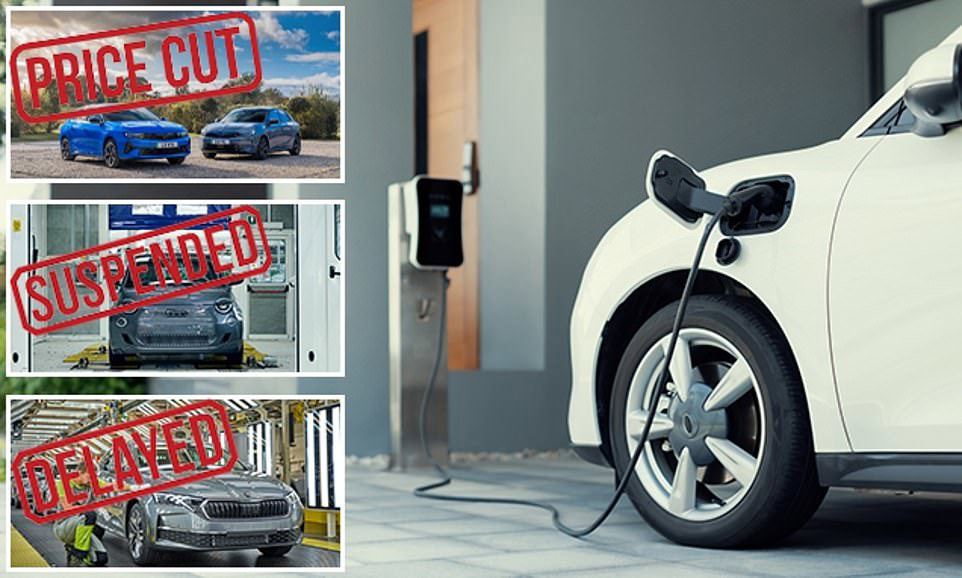Resistance To EV Mandates Grows Among Car Dealerships

Table of Contents
Financial Concerns and Infrastructure Challenges
The transition to an EV-centric market presents significant financial challenges for car dealerships. Many are hesitant to embrace government mandates due to substantial upfront investment costs and the lack of sufficient charging infrastructure.
High Initial Investment Costs
Adapting to sell and service EVs requires a considerable financial commitment. Dealerships face multiple expenses:
- Higher training costs for technicians: EV mechanics require specialized training to work on high-voltage systems and complex battery technology.
- Need for specialized equipment: This includes installing fast chargers, acquiring diagnostic tools specific to EVs, and upgrading existing workshop infrastructure.
- Inventory management challenges: Managing EV inventory presents unique challenges due to longer lead times and potentially higher storage costs for batteries.
For example, installing a single fast charger can cost anywhere from $10,000 to $50,000, depending on the power output and installation requirements. Training technicians to service EVs can add thousands more to the overall investment. This high initial investment presents a significant barrier for many dealerships, especially smaller independent ones.
Lack of Sufficient Charging Infrastructure
The inadequate public charging infrastructure remains a major obstacle to widespread EV adoption and contributes significantly to resistance to EV mandates. Dealerships are understandably hesitant to invest heavily in EVs if consumers lack convenient and reliable charging options.
- Insufficient charging points: Many areas, particularly rural regions, lack the necessary number of public charging stations.
- Uneven distribution across regions: Charging infrastructure is often concentrated in urban areas, leaving drivers in less populated regions with limited options.
- Concerns about charging speed and reliability: Concerns persist about the speed of charging and the reliability of charging stations, impacting consumer confidence and creating range anxiety.
A comparison of charging infrastructure density between major cities and rural areas starkly highlights this disparity, underscoring the need for more widespread and reliable charging networks before widespread EV adoption becomes a reality.
Consumer Demand and Market Readiness
While EV sales are increasing, significant regional variations in consumer interest and market readiness influence dealerships' reluctance to fully embrace EV mandates.
Limited Consumer Interest in Certain Regions
EV adoption rates vary considerably across different regions, reflecting diverse consumer preferences and economic factors.
- Higher cost of EVs compared to gasoline-powered vehicles: The higher initial purchase price of EVs remains a significant barrier for many potential buyers.
- Range anxiety: Concerns about limited driving range, especially in areas with sparse charging infrastructure, continue to deter potential EV buyers.
- Limited selection of EV models: The availability of EV models varies, limiting consumer choices and impacting market penetration.
Data comparing EV adoption rates between urban and rural areas clearly demonstrates this disparity, suggesting that government policies need to consider these regional differences to effectively promote EV adoption.
Concerns about EV Technology and Reliability
Dealerships also express apprehension regarding the long-term reliability and potential maintenance challenges associated with EVs.
- Battery life concerns: The lifespan and degradation of EV batteries are significant unknowns, potentially leading to expensive replacements.
- Potential for expensive repairs: Repairing EV components can be significantly more costly than repairing conventional vehicle parts.
- Lack of experienced mechanics: The shortage of trained EV mechanics adds to the uncertainty and potentially increases repair costs.
Recent reports on battery degradation and the relatively high cost of certain EV repairs further fuel these concerns, highlighting the need for improved battery technology and more affordable repair options.
Regulatory Hurdles and Government Support
Navigating complex and sometimes conflicting government regulations related to EV sales and infrastructure adds another layer of complexity to the challenge, contributing to resistance to EV mandates.
Complexity of EV Mandates and Regulations
Dealerships face significant difficulties in understanding and complying with the often-confusing and inconsistent regulations surrounding EV sales and infrastructure development.
- Confusing or inconsistent regulations across different jurisdictions: Variations in regulations across states or countries create administrative burdens and uncertainty.
- Bureaucratic hurdles in obtaining permits and incentives: The process of obtaining necessary permits and accessing government incentives can be slow and cumbersome.
Examples of specific regulations causing problems for dealerships, such as conflicting building codes or overly stringent permitting processes, need to be addressed to reduce the administrative burden.
Insufficient Government Support and Incentives
The lack of adequate government support and incentives further fuels the resistance to EV mandates among dealerships.
- Limited financial assistance for infrastructure development: Insufficient funding for building charging stations hinders the development of necessary charging infrastructure.
- Insufficient training programs for technicians: Limited availability of training programs makes it difficult for dealerships to acquire the necessary expertise to service EVs.
- Lack of consumer subsidies: Insufficient consumer incentives to purchase EVs reduces consumer demand, affecting dealership profitability.
A comparison of government support for EV adoption in different countries reveals a significant variation in the level of support provided, highlighting the need for more comprehensive and targeted policies.
Conclusion: Addressing Resistance to EV Mandates
The growing resistance to EV mandates among car dealerships stems from a complex interplay of financial concerns, consumer demand issues, and regulatory hurdles. Addressing these concerns is crucial for the successful implementation of EV mandates and the achievement of broader EV adoption. Key takeaways include the need for increased investment in charging infrastructure, more comprehensive technician training programs, and clearer, more consistent regulations. Addressing the resistance to EV mandates requires a collaborative approach from all stakeholders—policymakers, manufacturers, and dealerships—to ensure a smooth transition to a sustainable transportation future. Open dialogue and proactive solutions are essential to overcome the challenges and achieve widespread EV adoption.

Featured Posts
-
 Nba Disciplinary Action Anthony Edwards Fined For Vulgar Language
Apr 29, 2025
Nba Disciplinary Action Anthony Edwards Fined For Vulgar Language
Apr 29, 2025 -
 Auckland Police Detain Du Val Founder Kenyon Clarke
Apr 29, 2025
Auckland Police Detain Du Val Founder Kenyon Clarke
Apr 29, 2025 -
 Willie Nelsons 4th Of July Picnic Texas Comeback
Apr 29, 2025
Willie Nelsons 4th Of July Picnic Texas Comeback
Apr 29, 2025 -
 Remembering The Fallen Fort Belvoirs Vigil For Helicopter Crash Victims
Apr 29, 2025
Remembering The Fallen Fort Belvoirs Vigil For Helicopter Crash Victims
Apr 29, 2025 -
 Securing Your Capital Summertime Ball 2025 Tickets A Step By Step Guide
Apr 29, 2025
Securing Your Capital Summertime Ball 2025 Tickets A Step By Step Guide
Apr 29, 2025
